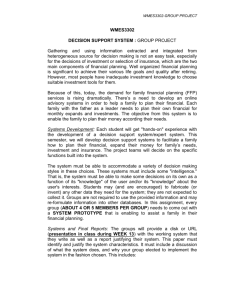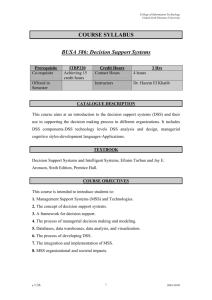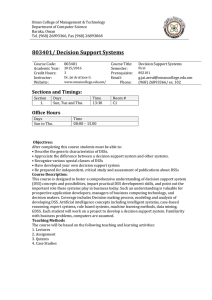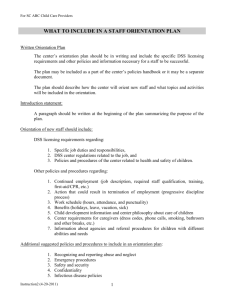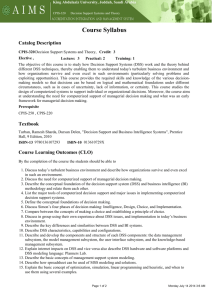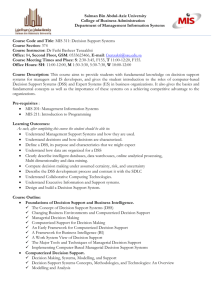MIS 305: Intelligent Support Systems Course Syllabus
advertisement
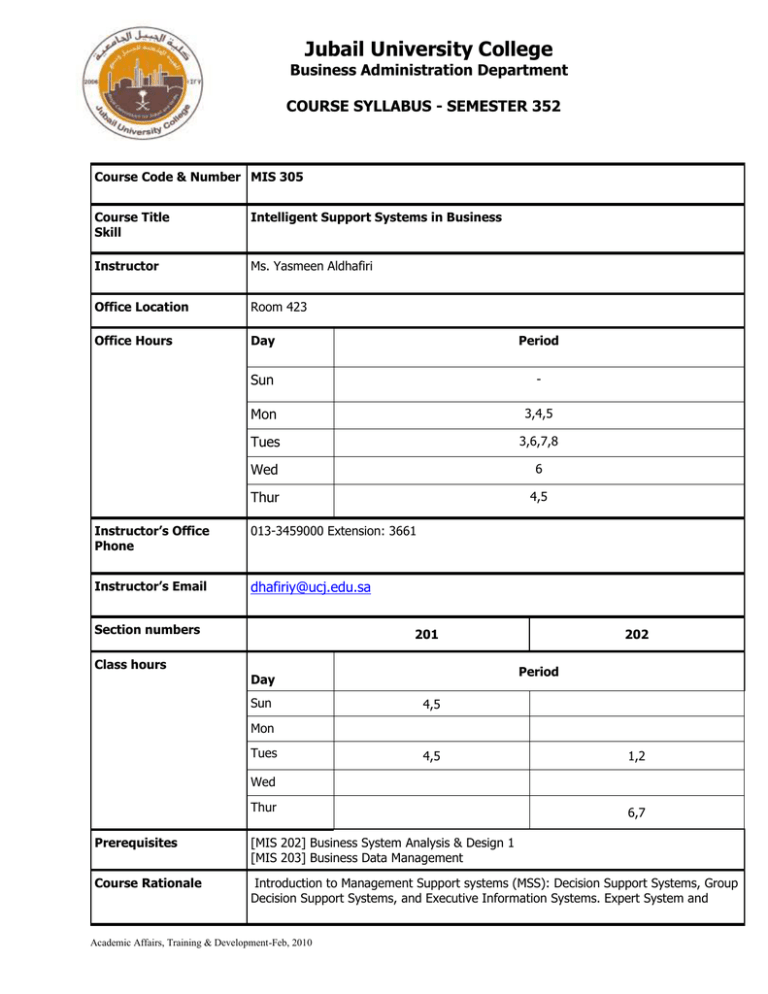
Jubail University College Business Administration Department COURSE SYLLABUS - SEMESTER 352 Course Code & Number MIS 305 Course Title Skill Intelligent Support Systems in Business Instructor Ms. Yasmeen Aldhafiri Office Location Room 423 Office Hours Day Period Sun - Mon 3,4,5 Tues 3,6,7,8 Wed 6 Thur 4,5 Instructor’s Office Phone 013-3459000 Extension: 3661 Instructor’s Email dhafiriy@ucj.edu.sa Section numbers Class hours 201 Period Day Sun 202 4,5 Mon Tues 4,5 1,2 Wed Thur 6,7 Prerequisites [MIS 202] Business System Analysis & Design 1 [MIS 203] Business Data Management Course Rationale Introduction to Management Support systems (MSS): Decision Support Systems, Group Decision Support Systems, and Executive Information Systems. Expert System and Academic Affairs, Training & Development-Feb, 2010 Neural Networks. Tools and Techniques for developing and using these systems. Integration of MSS. Team projects to develop MSS. Course Objectives Learners will be able to: Understand today’s turbulent business environment and describe how organizations survive and even excel in such an environment. Understand the need for computerized support for managerial decision making. List the major tools for computerized decision support. Explain the importance of models and model management. Become familiar with some DSS application areas. Understand the basic concepts of management support systems (MSS) Methods of Instruction The course will combine lecture, and group discussion into an interactive learning experience. Key responsibilities for each participant are to attend all classes, be prepared for each class, participate constructively in the discussions, and maintain a broad perspective. Additional mentoring responsibilities for both the instructor and presenters include facilitating the learning experience by maintaining focus, encouraging student involvement, and insuring the understanding of key concepts and applications. Required Textbook Proposed Websites Grading Scheme Turban et al, 2007, Decision Support and Business Intelligence Systems, new Jersey, Pearson. 9th E.d. 1. 2. 3. 4. http://www.decisionsupport.com/ http://dssresources.com/ http://www.ifm.eng.cam.ac.uk/dstools/ www.nks.nhs.uk/decisionsupport.asp Any exam not taken as scheduled will result in a zero. All assignments submitted after the due date will be subject to a 10-point penalty. Computation of the final grade for theory will be as follows: Quizzes Assignments Midterm Examination Final Examination 20% 20% 20% 40% Total 100% For the Practical the final grade would be calculated as below: Midterm 40% Final 60% Total 100% Note: For the Final course grade 70% weight would be given to theory and 30% weight to practical. Academic Affairs, Training & Development-Feb, 2010 Jubail University College Grading Scale Total Points Letter Grade A+ A B+ B C+ C D+ D F W WP WF DN I P Percentage 90-100% 90-94% 85-89% 80-84% 75-79% 70-74% 65-69% 60-64% 0-59% Withdrawal Withdrawal while Pass Withdrawal while Fail Denial Incomplete Pass Grade Point 4.0 3.75 3.5 3.0 2.5 2.0 1.5 1.0 0.0 N/A N/A 0.0 0.0 N/A N/A Course Outline Week Topics & Activities 1 Class & Course Introduction Decision Support Systems and Business Intelligence Class objectives, overview of DSS, BI? 2 Decision Support Systems and Business Intelligence Changing business environments and computerized decision support, managerial decision making, computerized support for decision making, an early framework for Computerized decision support, the concept of DSS Lab: Intro to Excel functions Decision Support Systems and Business Intelligence a framework for BI, a work system view of decision support, the major tools and techniques for managerial decision support Lab: Data Tables Decision Making, Systems, Modeling and Support Decision making, models, phases of decision making process, the Intelligence phase, design phase (Quiz 1) Decision Making, Systems, Modeling and Support The choice phase, the implementation phase, how decisions are supported Lab: What-If Analysis Decision Support Systems Concepts, Methodologies and Technologies: An Overview DSS configurations, DSS descriptions, DSS characteristics and capabilities, DSS classifications, components of DSS, the data management subsystem Lab: Vlooukup/Hlookup Decision Support Systems Concepts, Methodologies and Technologies: An Overview 3 4 5 6 7 Academic Affairs, Training & Development-Feb, 2010 Notes Chapter 1 Chapter 1 Chapter 2 Chapter 2 Chapter 3 Chapter 3 8 9 10 11 12 13 14 15 the model management subsystem, the user interface subsystem, the knowledge based management subsystem, the DSS user, DSS hardware Lab: If Statement (Practical midterm) Midterms Modeling and Analysis MSS modeling, structure of mathematical models of decision support, certainty, uncertainty and risk, MSS modeling with spreadsheets, mathematical programming optimization, multiple goals, sensitivity analysis, what-if analysis, and goal seeking, decision analysis with decision tables and decision trees Lab: Nested If Modeling and Analysis multi-criteria decision making with pairwise comparisons, problemsolving search methods, simulations, visual interactive simulation, quantitative software packages and model base management Lab: Nested If Business Performance Management BPM overview, strategize, plan, monitor, act and adjust, performance measurement, BPM methodologies, BPM technologies and applications, performance dashboards and scoreboards Lab: Scenarios Collaborative Computer-Supported Technologies And Group Support Systems Making decisions in groups, supporting groups with computerized systems, tools for indirect support of decision making Lab: Scenarios (Quiz 2) Collaborative Computer-Supported Technologies And Group Support Systems Integrated groupware suits, direct computerized support for decisionmaking, products and tools for GDSS/GSS and successful implementation. Lab: Basic Dashboards Knowledge Management Introduction to knowledge management, Organizational learning and transformation, knowledge management activities, approaches to knowledge management, IT in KM, KMS implementation, roles of people in KM, ensuring the success of KM efforts. Lab: Basic dashboards Decision tables (time permitting) Intelligent Systems over the Internet 16 17,18 Academic Affairs, Training & Development-Feb, 2010 Practical Final Exam Theoretical Final Exam Chapter 4 Chapter 4 Chapter 9 Chapter 10 Chapter 10 Chapter 11 Chapter 14 Jubail University College Policies Attendance 1. Attending at punctual time: Present otherwise the student is absent. 2. Late attendance 0 < 5 minutes is late 3. Late ≥ 5 minutes: is absent Notes: (i) Every 3 late are counted as 1 absent 3 (ii) Every × total semester contact hours + 1 is DN 15 Grading 1. Quality point: is the result of multiplying the credit hours by the grading points. 2. Semester GPA: is the result of dividing total quality points achieved in all courses at that semester by total graded credit hours of all courses in that semester. 3. Cumulative GPA in a semester: is the sum of total quality points achieved in all courses up to that semester divided by the total credit hours graded for all courses up to that semester Plagiarism & Cheating 1. Cheating is a serious offence and will be punished by the JUC. 2. Talking, looking at your colleagues’ exam papers or any other suspicious act is considered cheating during exam. 3. Student will fail the subject if caught cheating. Academic Affairs, Training & Development-Feb, 2010
